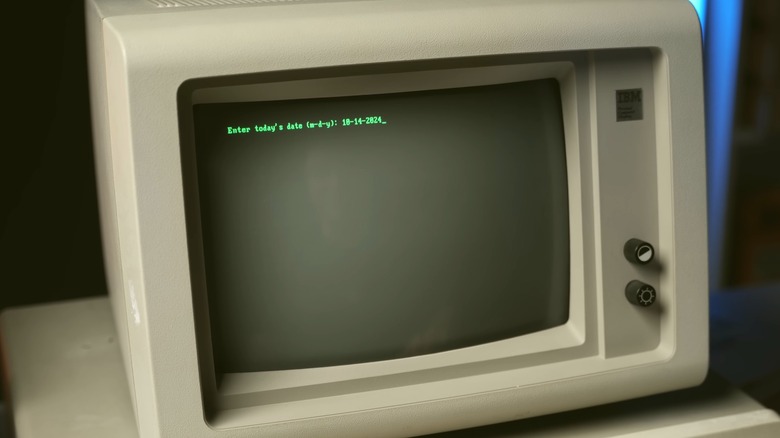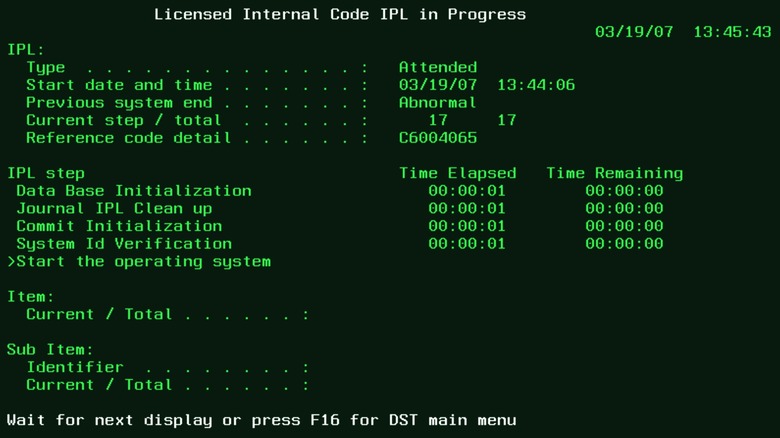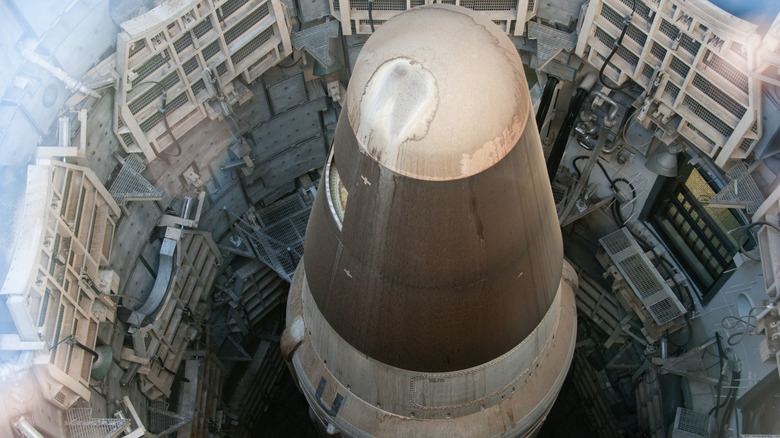Costco And Home Depot Still Use IBM Computers From The '80s: Here's Why
If you work at Costco or happen to have walked by one of their computers and wondered if you've traveled back in time, you're not alone. It's not only a phenomenon at Costco, as Home Depot and many companies around the United States continue to use IBM computers developed in the 1980s to manage their businesses. Seeing as it's the 2020s and the 1980s ended decades ago, this seems strange. There are far more advanced systems readily available; some are sold in stores that use old IBM models.
While strange to see, there's actually a very good reason Costco and others use antiquated computers from the Cold War, even if it's not immediately obvious. Costco sells plenty of great gadgets and PCs, but for years, the company has relied on the IBM AS/400 family of computers running the OS/400 operating system. More specifically, they used IBM 5250s connected to an IBM AS/400 mainframe, which handles transactions, inventory management, store finances, and more.
The reason these systems are still used is due to several factors, including system reliability, costs, and the fact that they can't be hacked. These computers are old — ancient in terms of modern technology, so they can't be hacked like any old system on the Internet. You require physical access to use them, and for these reasons, Costco and other businesses continue to operate them. IBM still supports them for this reason, though the computers have evolved into the System i, using the IBM i operating system.
Why some companies still use antique IBMs
The reason these systems are unhackable, outside of requiring physical access to most of them, is that they are obscure. One of the main reasons that Apple's computers are targeted less often than PCs by viruses is that they are in a niche, making up only around 10% of the market. The IBM i systems enjoy security through obscurity, as they're not primary targets. This leaves companies like Costco safe in their use, but that's not the only reason they continue to operate them.
The system's reliability is historically and demonstrably efficient, boasting uptimes in excess of 99.99%. For a massive business with worldwide operations, that's reliability that cannot be beaten. IBM has a long history of making reliable systems. That's enticing for any business, but another factor is cost efficiency. Costco is a frugal company, allocating only 10% of revenue for operations. Maintaining older systems like the IBM i or AS/400 is significantly cheaper than modern systems like Oracle.
Costco is able to manage its inventory remarkably easily with its legacy systems, and it's been doing so for decades. Walmart uses around 140,000+ SKUs (Stock Keeping Units), while Costco limits its inventory to around 4,000. That's comparatively low, and the requirements for inventory management are significantly less complex. This makes IBM's computers, which were first released in 1988, an ideal platform for continuing business as normal. Given these reasons, it's unlikely that Costco will make any changes in the near future.
If it ain't broke, don't fix it!
Costco and many other companies rely on these legacy systems because of the old adage "if it ain't broke, don't fix it," and they're hardly alone. You may have heard that the United States Air Force used giant floppy disks and ancient computer systems to manage its nuclear weapons security, and you heard right. This is no longer the case, as the Air Force Global Strike Command updated its systems in 2019, but that only came after decades of reliance on now-antiquated computer systems that relied on outdated technology.
The Air Force had used the Strategic Automated Command and Control System (SACCS) since the 1970s. Like Costco, the system was made by IBM, and ran on an IBM Series/1 computer, which required eight-inch floppy disks to manage its stockpile of intercontinental ballistic missiles housed in silos around the country. The Air Force's reasons for keeping the ancient computers are the same as Costco's: reliability, cost, and they were entirely unhackable. You can't hack an Air Force nuclear arms computer if you need to be physically present at a workstation with a floppy disk in hand. Security through obscurity worked well for nearly half a century, but don't worry. While Global Strike Command modernized its systems, it's still not logged onto the Internet and secured behind a simple password or anything of the like. Still, the fact that the government continued to use a system from the 1970s for so long is a testament to its reliability.


